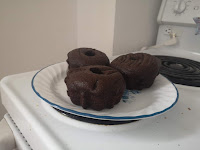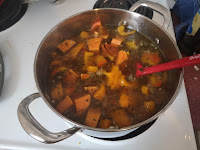"Pinkwashing?" Let's lose the facile labels and try a real, civil conversation.
On July 14th,
2016, the Pride flag was raised at City Hall in Halifax, NS. For the first time in recent memory, I wasn’t
there for the flag-raising. I heard
about it, though, from members of the LGBTQ community, members of the Jewish
community, and allies who have no connection to either community other than
that they support both. And what I heard
angered me, saddened me, and left me feeling very, very tired. Since Thursday, I have responded to articles
posted to Facebook. I have shared my own
status updates with pictures I took at the Pride March in Jerusalem. Although I wanted to address the subject –
the very messy subject – in a more substantive way, it has taken me this long
not simply to gather my thoughts, but rather, to find the energy to once again
educate people who have often consciously chosen not to be educated. It is easier to accept a more dramatic
narrative, perhaps, especially when that is the one you hear first. It is easier to believe what you hear if the
Jewish community does not stand up and speak out – because if we do not speak
out, could it be that we have no defense against the charges constantly leveled
against us? (If you know your history,
you may recall that the last time Jews sat quietly and hoped simply to be left
alone to live their lives, 6 million were murdered. Saying nothing has not proven to work for us.)
And what are
my credentials for opening my mouth about this?
I’m a Jew. I’m a Halifax Jew. I’ve
actually been to Israel, unlike many who protest against it. I have been an ally to the LGBTQ community my
entire life –before I was a mother, and certainly before I knew that my
daughter was gay. I have been called a
Nazi, and I have been spat upon and told that Hitler didn’t use enough gas, by
people who support the idea that Israel is oppressing Palestinians. That behaviour alone has nothing at all to do
with Israel’s domestic policies and its right to self-determination: it is Jew
hatred, plain and simple.
I know – as many
who disagree with Israel do not seem to understand – that no group is a
monolith – so you won’t hear me say “all” of any group. Not “all Jews,” not “all Christians,” not “all
Muslims,” not “all lesbians…” We could
go on there, but I think you get the drift.
So let’s
talk first about that. Pinkwashing, you
say? What’s that when it’s at home? Simply, it refers to the charge that a
country highlights its welcome to members of the LGBTQ community in an effort
to deflect attention from what those who make the charge term human rights
abuses. Oddly enough, that charge has
only ever been levelled at Israel.
Perhaps the Queer Arab group is unaware of Israel’s record on human
rights in general, but specifically regarding LGBTQ Israelis.
When
|
What
|
1998
|
Decades-old policy prohibiting any
type of sodomy was repealed.
|
1992
|
Workplace discrimination against LGBTQ
persons prohibited.
|
1993
|
Israeli Defense Force approved policy
that LGBTQ members could serve in any capacity.
|
1994
|
Supreme Court ruled in favour of
spousal benefits for same-sex couples.
|
1997
|
Defense Minister announced that same-sex
partners would be recognised as family members.
|
2000
|
Legal age of consent for LGBTQ persons
lowered from 18 to 16.
Supreme Court ruled that lesbians
could become the legal adoptive parents of their partner’s children.
|
2004
|
LGBTQ couples qualify for common-law
marriage.
LGBTQ couples qualify for full
inheritance rights.
|
2005
|
LGBTQ couples granted full adoption rights.
|
2006
|
Israel recognised same-sex marriage
performed abroad
|
It is
abundantly clear that Israel has a history of working towards not simply
tolerance or acceptance of its entire LGBTQ population, but rather, full
equality. If you check the records of
many other western nations, you will not see this steady progression. And if you check the records of other
countries in the Middle East, you simply will not see this at all. In fact, it is not “pinkwashing” to state
what is true.
Some Historical Context
The Jewish
people have been indigenous to the land of Israel for more than 3,000 years; in
fact, Jewish communities existed in the land more than 1,500 years before Islam
appeared there.
More than
150 years ago, many Jews began returning to Israel, and by 1860, Jerusalem had
once again become a majority-Jewish area.
In 1920, the international community recognised the indigenous rights of
the Jewish people and endorsed the restoration (not the creation!) of this Jewish homeland.
The Jewish
people accepted that others also now lived on that land and supported the UN’s
1947 recommendation to partition the land so that Palestinian Arabs could
establish the first Palestinian state. That
didn’t go so well. Arab leaders – then,
as now – refused to accept any Jewish state and have historically dismissed any
compromise that allowed for a sovereign Jewish nation in the Middle East. Instead, they launched a war with disastrous
consequences for their own people and have continued a policy of violence and
aggression towards Israel. After the
1948 war, more than 850,000 Jews fled rising persecution or were expelled from
other Arab and Muslim countries. In
fact, between 1949 and 2000, as the Jewish population dropped dramatically
throughout the Middle East, the Palestinian population increased from about
180,000 to 1,215,000 (Note: fails the definition of genocide.)
What About the West Bank?
The West
Bank figures strongly in any protests about Israel. Israel’s efforts to find peace have been
soundly rejected, in 1937, 1947, 2000, and 2008, largely because agreement
would mean accepting the right of Israel to exist as a nation. Israel has both the right and the obligation
to protect its citizens, and so it does maintain a West Bank presence – if terrorist
did not continue to endanger, assault, and murder Jews, there would be no need
for it. There is no evidence that the
Palestinian Authority wishes to prevent such terrorism – to the contrary, there
is incontrovertible proof that Palestinians celebrate the murder of Jews (http://www.jpost.com/Arab-Israeli-Conflict/Palestinians-celebrate-terror-attack-in-Tel-Aviv-Saudis-strongly-condemn-456344);
and further, that they teach hatred of Jews even to small children.
If this is
Israel’s peace partner, how is it that Israel alone is held responsible for the
fact that there still is no peace?
Israel
entered the West Bank after it was
attacked by Jordan in 1967. It was
obligated by UN Resolution 242 (1947) to administer the area until peace (or at
least détente) was reached. While it
took more than a decade for much calming to occur in the area, by way of
agreement with Egypt in 1979 and with Jordan in 1994, the PLO still refuses
peace.
What about Gaza, though, and those
illegal settlements?
In fact, the
settlements, which account for less than 1% of the total West Bank area, while
they are a hot topic, are legal and supported by Israel’s legal, historic, and
security interests in the area. The settlements
do not violate UN Resolution 242, nor any agreements made under the Oslo
Accords. Nonetheless, Israel hasn’t
authorised new settlements since 1993 and agreed to freeze building in existing settlements in 2010.
Remember
that there were no settlements when Palestinian leaders launched attacks
against Jews in 1920, or when Israel was attacked in 1948 and 1967. In a further effort to reach peace, Israel
pulled out of Gaza in 2005, evacuating all Gaza settlements. You need only pay slight attention to the
news to see that this did not bring peace.
Following the disengagement in 2005, terrorist attacks and hostility
actually increased, as Israel faced barely a day without being bombed by
Hamas. In fact, Hamas, whose charter is
explicit in its wishes for Israel and for Jews, has fired tens of thousands of
rockets and mortars at Israeli civilians since 2005. Children’s playgrounds in the Israeli city of
Sderot, which is at the border with Gaza, must have bomb shelters due to the
frequency of attacks. The Hebrew writing
on the structure tells children to enter as soon as they hear a red alert. This obscenity on a children’s playground
must exist because Hamas targets children and other civilians. They have launched attacks at kindergartens,
hospitals, and yes, playgrounds.

Israel
inspects shipments to Gaza, which infuriates Palestinians and their supporters;
however the UN’s Palmer Report confirms that the weapons blockade is legal. Both the Red Cross and the World Health
Organisation have said repeatedly that there is no humanitarian crisis in Gaza
and acknowledge the weekly delivery of thousands of tons of aid – and yes, this
aid is inspected for weapons, because history has proven that there are
continual attempts to get weapons into the area to use against Israel.
Gaza is
ruled solely by Palestinians and shares a border with Egypt, over which Israel
has no control. Israel does control its
own borders, of course, along with its airspace and coastline, to protect its
citizens.
Well, what about that awful
wall? The apartheid wall?
The security
barrier was a direct response to campaigns of violence against Israel in 2000.
The 2nd Intifada killed more than 1,000 Israeli men, women, and
children. People of every tradition and ethnicity were targeted by the attacks,
and Palestinian leaders have since admitted that the barrier has obstructed
suicide bombing missions.
BDS: Boycott, Divestment, Sanctions
The BDS
movement has hijacked social justice language to promote the elimination of
Israel and to question its right to exist as a sovereign nation. It promotes misinformation and outright lies
to isolate and delegitimise the nation.
Even its cofounder, Omar Barghouti (who received his university
education in Tel Aviv, Israel) states clearly, “We oppose a Jewish state in any
part of Palestine.” Because the BDS
movement insists that Israel itself and much of the land surrounding it are
part of a nation called Palestine, it denies the right of Israel to remain in
the land where Jews have lived for more than 3,000 years. You are encouraged to read the booklet “Explaining
BDS,” which you can find at www.standwithus.com/booklets/ExplainingBDS
The
unilateral Palestinian declaration of statehood was an effort to circumvent any
meaningful negotiations to peace, which would have had to occur with
Israel. The move violates all international treaties the PLO signed
with Israel, as well as UN Resolutions 242 and 338, which call for
negotiations.
Does this
look like expansion to you?
A Few Words About the Hamas Charter
It is worth
being very explicit about this. Make no
mistake about it: Israel’s “peace partner” does not want peace. The slogan shouted by Palestinians and their
supporters in the diaspora, “From the river to the sea, Palestine will be free”
means only one thing. The only thing
between the river and the sea is Israel.
For Hamas, only the utter destruction of Israel will help it meet its
goal.
The Hamas
Charter is easily available, and here are a few examples for you that may shed
some light on why this peace process has failed every time.
From the
preamble: “Israel will exist and will continue to exist until Islam will
obliterate it, just as it obliterated others before it.”
Article
7: “The Day of Judgement will not come
about until Moslems fight the Jews (killing the Jews), when the Jew will hide
behind stones and trees. The stones and
trees will say O Moslems, O Abdulla, there is a Jew behind me. Come and kill him.”
Article
13: “Initiatives and so-called peaceful
solutions and international conferences, are in contradiction to the principles
of the Islamic Resistance Movement.”
What do you support if you support
the demands of Queer Arabs Halifax?
Pride has
always been political. It has also
always been – or tried to be – inclusive.
And it has done so in a climate that was sometimes very hostile. The
demands of Queer Arabs Halifax to exclude one group are dangerous: they say
that the group ostracises them and other people of colour, when in fact, as has
been said, they would be safer in Tel Aviv than they would in any other Middle
Eastern country. And what about the
effects of such an exclusion on Queer Jews? Jews already face plenty of hostility,
even in beautiful Halifax. The message here
is that it’s ok to exclude Jews, and that flies in the face of the message of inclusion
of Halifax Pride.
For anybody
to align themselves with a group that supports the delegitimisation of a
sovereign nation, that supports the annihilation of Israel, and that also has a
long history of LGBTQ persecution is to align themselves with hate. This is not the Halifax I know. This is not the Pride I know.





































